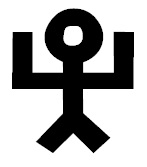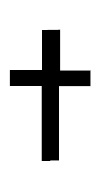Shalom, everyone.
I've decided to revive this topic because I still feel it is in everyone's best interest to understand Hebrew, because I believe it will be the "lingua franca" of the Millennium.
Let's talk about Hebrew syntax (tachbir). First of all, the word order is not as significant as it is in English. It doesn't matter whether you say, "Barukh ataah et Adonai" or "Barukh et Adonai ataah" or "Ataah barukh et Adonai" or "Ataah et Adonai barukh" or "Et Adonai barukh ataah" or "Et Adonai ataah barukh." They all mean the same thing: "You bless Adonai (the Lord)." The little word "et" identifies the word following it as the direct object in the sentence. "Atah" meaning "you" is the subject and "barukh" meaning "bless" is the verb. The convention is to begin the sentence with the verb followed by the subject and then the object (if there is one). Therefore, we usually find, "Barukh ataah et Adonai."
The personal pronouns used for the subject in a sentence are these:
Aniy, spelled "alef-qamets-nun-chireq-yod," (masculine or feminine singular) = I
Ataah, spelled "alef-patach-tav-qamets-hei," (masculine singular) = thou (you singular)
At, spelled "alef-patach-tav," (feminine singular) = thou (you singular)
Huw, spelled "hei-shureq," (masculine singular) = he
Hiy, spelled "hei-chireq-yod," (feminine singular) = she
Anachnuw, spelled "alef-patach/sheva-nun-patach-chet-sheva-nun-shureq," (masculine or feminine plural) = we
Atem, spelled "alef-patach-tav-segol-mem," (masculine plural) = ye (you plural)
Aten, spelled "alef-patach-tav-segol-nun," (feminine plural) = ye (you plural)
Hem, spelled "hei-segol-mem," (masculine plural) = they
Hen, spelled "hei-segol-nun," (feminine plural) = they
(Again, remember that in Hebrew EVERYTHING is either masculine or feminine.)
The pronouns that are used for the object in the sentence are these:
Otiy, spelled "alef-cholem-tav-chireq-yod," (masculine or feminine singular) = me
Otkhaa, spelled "alef-cholem-tav-sheva-khaf-sofit-qamets," (masculine singular) = thee (you singular)
Otakh, spelled "alef-cholem-tav-qamets-khaf-sofit-sheva," (feminine singular) = thee (you singular)
Otow, spelled "alef-cholem-tav-cholem-vav," (masculine singular) = him
Otaah, spelled "alef-cholem-tav-qamets-hei," (feminine singular) = her
Otanuw, spelled "alef-cholem-tav-patach-nun-shureq," (masculine or feminine plural) = us
Etkhem, spelled "alef-segol-tav-sheva-khaf-segol-mem," (masculine plural) = you (you plural)
Etkhen, spelled "alef-segol-tav-sheva-khaf-segol-nun," (feminine plural) = you (you plural)
Otaam, spelled "alef-cholem-tav-qamets-mem," (masculine plural) = them
Otaan, spelled "alef-cholem-tav-qamets-nun," (feminine plural) = them
(The vav with a dot over it is a "cholem-vav" and pronounced as "ow" in "rainbow." The vav with a dot in the middle and to the left of the letter has its own name, a "shureq." A "shureq" is pronounced as "oo" in "moon" and is transliterated as "uw." A "khaf-sofit" is an "ending khaf." It looks different from the regular khaf, having a tail. Often, this letter will take either a "sheva" or a "qamets" written within the letter. I have highlighted the actual letter, a consonant, and left the vowel pointing without the boldface. A "shureq," being the combination of a consonant and the vowel-pointing, is also boldfaced. Also, a "sheva" is like our "schwa." In transliteration, I usually forgo it altogether. If it is pronounced at all, it is not emphasized, and it is often used to form a consonant blend.)
These pronouns then can be attached to the noun as suffixes for possessive pronouns:
For instance, the root word for "name" is "shem" spelled "shin-segol-mem."
shmiy, spelled "shin-sheva-mem-chireq-yod," (masculine or feminine singular suffix) = my name
shimkhaa, spelled "shin-chireq-mem-sheva-khaf-sofit-qamets," (masculine singular) = thy name (your name, singular)
shmakh, spelled "shin-sheva-mem-patach-khaf-sofit-sheva," (feminine singular) = thy name (your name, singular)
shmow, spelled "shin-sheva-mem-cholem-vav," (masculine singular) = his name
shmaah, spelled "shin-sheva-mem-qamets-hei," (feminine singular) = her name
shmeenuw, spelled "shin-sheva-mem-tsere-nun-shureq," (masculine or feminine plural) = our name
shimkhaam, spelled "shin-chireq-mem-sheva-khaf-qamets-mem," (masculine plural) = your name (plural)
shmeenuw, spelled "shin-sheva-mem-tsere-nun-shureq," (feminine plural) = your name (plural)
shimkhem, spelled "shin-chireq-mem-sheva-khaf-segol-mem," (masculine plural) = their name
shimkhen, spelled "shin-chireq-mem-sheva-khaf-segol-nun," (feminine plural) = their name
Notice that the root of all of these words is "SH-M," spelled "shin-mem," regardless what vowel is put between these letters or what follows them.
Thus, Eloheenuw (or as it is often written "Eloheinu"), spelled "alef-segol-lamed-cholem-hei-tsere-nun-shureq," means "our Elohiym" or "our God."
So, in the "Shema," we find the following in the Hebrew:
Deuteronomy 6:4
4 Sh'ma Yisra'el YHWH Eloheenuw YHWH echad:
JPS Hebrew-English Tanakh
Literally, this translates to...
4 Hear Isra'el (the)-LORD our-God (the)-LORD one.
I've decided to revive this topic because I still feel it is in everyone's best interest to understand Hebrew, because I believe it will be the "lingua franca" of the Millennium.
Let's talk about Hebrew syntax (tachbir). First of all, the word order is not as significant as it is in English. It doesn't matter whether you say, "Barukh ataah et Adonai" or "Barukh et Adonai ataah" or "Ataah barukh et Adonai" or "Ataah et Adonai barukh" or "Et Adonai barukh ataah" or "Et Adonai ataah barukh." They all mean the same thing: "You bless Adonai (the Lord)." The little word "et" identifies the word following it as the direct object in the sentence. "Atah" meaning "you" is the subject and "barukh" meaning "bless" is the verb. The convention is to begin the sentence with the verb followed by the subject and then the object (if there is one). Therefore, we usually find, "Barukh ataah et Adonai."
The personal pronouns used for the subject in a sentence are these:
Aniy, spelled "alef-qamets-nun-chireq-yod," (masculine or feminine singular) = I
Ataah, spelled "alef-patach-tav-qamets-hei," (masculine singular) = thou (you singular)
At, spelled "alef-patach-tav," (feminine singular) = thou (you singular)
Huw, spelled "hei-shureq," (masculine singular) = he
Hiy, spelled "hei-chireq-yod," (feminine singular) = she
Anachnuw, spelled "alef-patach/sheva-nun-patach-chet-sheva-nun-shureq," (masculine or feminine plural) = we
Atem, spelled "alef-patach-tav-segol-mem," (masculine plural) = ye (you plural)
Aten, spelled "alef-patach-tav-segol-nun," (feminine plural) = ye (you plural)
Hem, spelled "hei-segol-mem," (masculine plural) = they
Hen, spelled "hei-segol-nun," (feminine plural) = they
(Again, remember that in Hebrew EVERYTHING is either masculine or feminine.)
The pronouns that are used for the object in the sentence are these:
Otiy, spelled "alef-cholem-tav-chireq-yod," (masculine or feminine singular) = me
Otkhaa, spelled "alef-cholem-tav-sheva-khaf-sofit-qamets," (masculine singular) = thee (you singular)
Otakh, spelled "alef-cholem-tav-qamets-khaf-sofit-sheva," (feminine singular) = thee (you singular)
Otow, spelled "alef-cholem-tav-cholem-vav," (masculine singular) = him
Otaah, spelled "alef-cholem-tav-qamets-hei," (feminine singular) = her
Otanuw, spelled "alef-cholem-tav-patach-nun-shureq," (masculine or feminine plural) = us
Etkhem, spelled "alef-segol-tav-sheva-khaf-segol-mem," (masculine plural) = you (you plural)
Etkhen, spelled "alef-segol-tav-sheva-khaf-segol-nun," (feminine plural) = you (you plural)
Otaam, spelled "alef-cholem-tav-qamets-mem," (masculine plural) = them
Otaan, spelled "alef-cholem-tav-qamets-nun," (feminine plural) = them
(The vav with a dot over it is a "cholem-vav" and pronounced as "ow" in "rainbow." The vav with a dot in the middle and to the left of the letter has its own name, a "shureq." A "shureq" is pronounced as "oo" in "moon" and is transliterated as "uw." A "khaf-sofit" is an "ending khaf." It looks different from the regular khaf, having a tail. Often, this letter will take either a "sheva" or a "qamets" written within the letter. I have highlighted the actual letter, a consonant, and left the vowel pointing without the boldface. A "shureq," being the combination of a consonant and the vowel-pointing, is also boldfaced. Also, a "sheva" is like our "schwa." In transliteration, I usually forgo it altogether. If it is pronounced at all, it is not emphasized, and it is often used to form a consonant blend.)
These pronouns then can be attached to the noun as suffixes for possessive pronouns:
For instance, the root word for "name" is "shem" spelled "shin-segol-mem."
shmiy, spelled "shin-sheva-mem-chireq-yod," (masculine or feminine singular suffix) = my name
shimkhaa, spelled "shin-chireq-mem-sheva-khaf-sofit-qamets," (masculine singular) = thy name (your name, singular)
shmakh, spelled "shin-sheva-mem-patach-khaf-sofit-sheva," (feminine singular) = thy name (your name, singular)
shmow, spelled "shin-sheva-mem-cholem-vav," (masculine singular) = his name
shmaah, spelled "shin-sheva-mem-qamets-hei," (feminine singular) = her name
shmeenuw, spelled "shin-sheva-mem-tsere-nun-shureq," (masculine or feminine plural) = our name
shimkhaam, spelled "shin-chireq-mem-sheva-khaf-qamets-mem," (masculine plural) = your name (plural)
shmeenuw, spelled "shin-sheva-mem-tsere-nun-shureq," (feminine plural) = your name (plural)
shimkhem, spelled "shin-chireq-mem-sheva-khaf-segol-mem," (masculine plural) = their name
shimkhen, spelled "shin-chireq-mem-sheva-khaf-segol-nun," (feminine plural) = their name
Notice that the root of all of these words is "SH-M," spelled "shin-mem," regardless what vowel is put between these letters or what follows them.
Thus, Eloheenuw (or as it is often written "Eloheinu"), spelled "alef-segol-lamed-cholem-hei-tsere-nun-shureq," means "our Elohiym" or "our God."
So, in the "Shema," we find the following in the Hebrew:
Deuteronomy 6:4
4 Sh'ma Yisra'el YHWH Eloheenuw YHWH echad:
JPS Hebrew-English Tanakh
Literally, this translates to...
4 Hear Isra'el (the)-LORD our-God (the)-LORD one.



